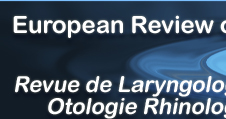 Issue N# 3 - 2012
Issue N# 3 - 2012

OTOLOGY
Middle ear barotraumas due to rhinopharyngeal scar tissue: Tubomanometry diagnostic and therapeutic contribution
Authors : Collin M, Coulange M, Devèze A, Montava M, Estève D, Lavieille J-P. (Marseille)
Ref. : Rev Laryngol Otol Rhinol. 2012;133,3:157-161.
Article published in french 
Downloadable PDF document french 
Summary :
Objective: Evaluation of tubomanometry contribution to diagnosis middle ear barotraumas in relation with rhinopharyngeal scar tissue, and contribution to check post-operative effectiveness of scar tissue surgical resection. Methods: Clinical cases study of two stewardesses who have lost their flight fitness consecutively to barotraumatic otitis during landing, engendered by rhinopharyngeal scar tissue. Results: Pre-operative tubomanometric parameters were abnormal in both cases : decrease of intratympanic pressure in one case, variability of tube opening latency index and lengthening of intratympanic pressure rising time in the other case. Surgical section during endonasal endoscopy results in initially abnormal tubomanometric parameters normalization, allowing resumption of flight fitness without any barotrauma. Conclusion: Some abnormal tubomanometric parameters help to establish causality link between middle ear barotrauma and rhinopharyngeal scar tissue for which surgical section is thus indicated. Post-operative tubomanometric parameters normalization prove surgical effectiveness. Then, flight fitness could then be restored.
Price : 8.50 €

|



